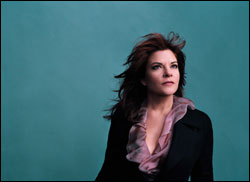ROSANNE CASH IS running late for our scheduled chat. When she finally picks up her phone, she sounds harried. “There’s a family crisis going on,” she says, “but that’s nothing new.” And then she lets out a small chuckle. As a member of country music’s most influential and storied clanthe singer-songwriter is the oldest daughter of country icon Johnny Cash, thus tying her, via marriage, to the Carter Familythis is familiar territory.
What is new is the release of Rules of Travel (Capitol Records), Cash’s first full-fledged studio album in a decade and five years in the making. Well, sort of . . . more like three and some change. Cash, 48, and her husband, guitarist-producer-songwriter John Leventhal, started work on it in 1998. But things quickly turned topsy-turvy. First, she found out she was pregnant. Then she lost her voicefor two full years.
Finally, in 2000, after the arrival of her fifth child, Jake, and a lot of sessions with a vocal therapist, Rosanne’s voice returned, and the couple began picking up where they had left off. Or as close as possibleafter the extended hiatus, Cash’s feelings toward a couple songs had changed. In particular, she says, she lost her taste for “Closer Than I Appear,” an original inspired by the omnipresent warning on rear-view mirrors, which she worried sounded dated.
“That song could have easily been on Seven Year Ache,” she opines. Most artists wouldn’t have a problem with that: The 1981 full-length she’s referring to topped the country charts and spawned three No. 1 hits. But Cash’s discography, which also includes the hard-edged Rhythm and Romance (1985), the desolate Interiors (1990), and the stripped-down 10 Song Demo (1996), makes one thing clear: She doesn’t like to repeat herself. “Closer”which, despite its author’s protestations, is just as solid as the other songs on Rulesultimately only made it on the album because Leventhal and Cash’s manager pressed for its inclusion.
SHERYL CROW, Teddy Thompson, and Steve Earle all share the microphone with Cash on Rules of Travel, but the most moving duet is “September When It Comes,” a haunting reflection on mortality and unresolved emotions, sung with her father. Originally, when Leventhal proposed having Johnny join her on the song, Cash wanted to scotch the idea, fearing it would be construed as a novelty, but she was swayed during a period when her father’s health was particularly bad. They cut the vocals in her father’s home studio; Rosanne cried while working on the song. Johnny is still with us; sadly, Rosanne’s stepmother, June Carter Cash, passed away in Maybut not before getting to hear the father-daughter duet. “She thought it was beautiful. She loved it and was very proud of it,” says Cash, who contributes liner notes to Carter Cash’s forthcoming final album, Wildwood Flower.
Of the 11 songs on Rules, eight were written or co-written by Cash. (Marc Cohn, Joe Henry, and Jakob Dylan also contributed material.) While part of her early reputation was staked on a knack for popularizing songs by decidedly non-Nashville types (John Hiatt, Tom Petty), Cash would have preferred to have supplied more of her own material early on. “I would have written a lot more songs,” she says, “but I kept having babies. That’s why some of the greatest artists in history didn’t have children: Georgia O’Keeffe, Mary Cassatt. But I didn’t want to make that trade-off.”
Cash is also the author of a collection of short stories (Bodies of Water), a children’s book (Penelope Jane: A Fairy’s Tale), and numerous magazine pieces, and she says the two disciplines have definitely bled into each other. “Writing a lot of prose made me more objective in my songwriting and gave me the ability to write in second and third person more than I was used to,” she says. “And I refined my editing skills a bit more. I think it’s very good for songwriting to write prose and vice versa, because if you’re a songwriter, you can kind of listen for the melody in prose.”
She may have taken her time, but Cash says she’s content with the rate at which her songwriting has matured. “It’s a lifetime’s work, and I feel like I’m in my middle years as a songwriter. I don’t think that once you get it, you get it overnight and then have it the same way forever. It’s an unfolding process.” With Jake now in preschool, she has more time to concentrate on her craft. “The songs I’m writing now, since I recorded the album, are opening up even more new territory.” Let’s hope we won’t have to wait another 10 years to hear them.






